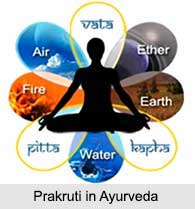 Prakruti or Constitution is the particular arrangement of energies present at birth is known in Ayurveda. Its utilization is up to us. It is the sourcebook for our health, strength and well-being and can also be the facilitator toward difficulties. Humans are far more complex and remarkable than any standard description could convey, whether it be Ayurvedic, astrological, biochemical or psychological.
Prakruti or Constitution is the particular arrangement of energies present at birth is known in Ayurveda. Its utilization is up to us. It is the sourcebook for our health, strength and well-being and can also be the facilitator toward difficulties. Humans are far more complex and remarkable than any standard description could convey, whether it be Ayurvedic, astrological, biochemical or psychological.
Pulse in Prakruti
A skilled Ayurvedic physician can measure an individual"s pulse and give information about the individual"s "prakruti" (constitution). From pulse examination he or she can discover what elements are in balance and what needs to be done. The pulse is utilized in Ayurveda in a way similar to Tibetan or Chinese medicine.
Elements in Creating Prakruti
Each constitution has different needs. All these needs assure the balance and better chances for good health and peace of mind. It also offers more up to date choices in health care methods which are most appropriate for an individual. The five elements come together to create three basic constitutional types. They are as follows:
•"Vata"
•"Pitta"
•"Kapha"
Characteristics of Elements of Constitution or Prakruti
If air and heaven dominate in an individual constitution, than the individual is "Vata" in nature. If fire and water take the lead in an individual"s physical form, than the individual is "Pitta" in nature. If water and earth hold superiority in an individual"s body from birth, than the individual is "Kapha" in nature. "Pittas" have sharp minds, passionate feelings (sometimes submerged) and are likely to want to lead. "Kaphas" are solid, reliable, easy-going people, who shouldn`t be pushed too far. Traditionally, the infuriated "Kapha" is compared to an enraged bull about to charge.
"Vatas" go for warm climes, "Pittas" for cooler ones and "Kaphas" for anything but humidity. Many people are born with double constitutions, or two "doshas". A "Pitta-Kapha" individual includes the characteristics of both these types. These individuals usually feel secure in management roles. A "Vata-Pitta" individual is appropriate in responding rapidly. They are gifted to express themselves with emotions and if they exceed it they are likely to find themselves coping with "hypoglycaemia". "Vata-Kaphas" face challenges while mental liveliness and determination are exact resources for them. They need affection to stay healthy and comfortable. They may experience complexity moving in cold winters.
Importance of Constitution or Prakruti
If an individual exploit his or her constitution and natural needs, he or she can become imbalanced. This imbalance or disease state is known as "vikruti". This imbalance can show up in his or her constitutional "dosha". If an individual whose original constitution (prakruti) is "Kapha", but he or she has developed an imbalance in "Vata dosha" due to his or her lifestyle choices. This "Vata" imbalance would be known as his or her "vikruti". To avoid this, warming, cooked foods are recommended. Clearly it could be useful to look at the psychological conditions underlying this person`s choices.




















